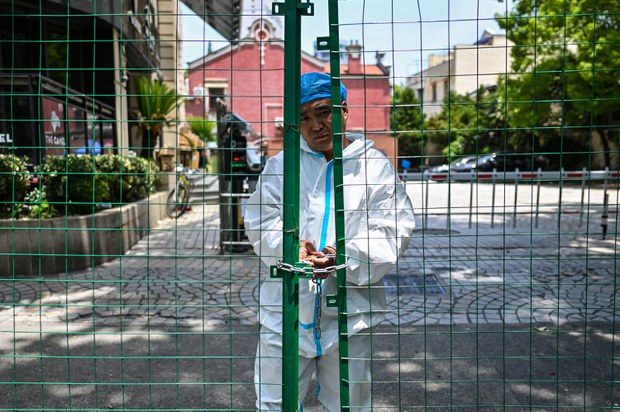Shanghai dissident stands trial for ‘insulting China’s leaders’ during lockdown
Share

A worker padlocks fencing securing a residential area under COVID-19 lockdown in the Xuhui district of Shanghai on June 8, 2022.
Rights activist Ji Xiaolong has stood trial in a Shanghai court on public order charges after he wrote to a Chinese leader criticizing the grueling COVID-19 lockdown of spring 2022, Radio Free Asia has learned.
The latest in a long line of COVID-19 dissidents to face the wrath of the government, Ji stood trial at the Pudong New District People’s Court on June 21 for “picking quarrels and stirring up trouble,” a charge frequently used to target peaceful critics of the ruling Communist Party.
According to his father, Ji Xinghua, the prosecution based its case on posts he made to Twitter that were “insulting” to China’s leaders.
“The prosecution said he tweeted something that insulted the country’s leaders,” Ji’s father said. “His lawyers said the authorities didn’t comply with regulations in their investigation and in their collection of evidence.”
“I don’t think that what he did caused any kind of public disorder, and I don’t think it adds up to picking quarrels and stirring up trouble,” he said.
Ji’s detention came after he wrote to then Shanghai ruling Chinese Communist Party secretary Li Qiang, calling on him to resign for “blindly following orders from the central government” when implementing weeks of grueling lockdown in the city earlier this year.
Li has since risen to the position of Chinese premier.
Calls to quit
Netherlands-based dissident Lin Shengliang said that Ji’s targeting of Li Qiang was likely the biggest factor behind his arrest and trial.
“They won’t talk about the [real reason], which was that he questioned Li Qiang’s COVID-19 containment measures in Shanghai at that time,” Lin said. “They are even less likely to mention that now.”
He said the key was that Ji had called in his petition for Li to step down.
In the petition, Ji also wrote that he was fine with being jailed for opposing government policies in an era of widespread internet censorship and surveillance of ordinary people.
He was already under residential surveillance at his home, and police had prevented him from going back to his hometown in Jiangsu’s Shazhou county to visit his elderly parents, he wrote.
Ji, who has already served a three-and-a-half year jail term for writing political graffiti in a Shanghai public toilet, was a vocal critic of Chinese leader Xi Jinping’s zero-COVID policy of stringent lockdowns, mass isolation and quarantine facilities and wave upon wave of testing that ended following nationwide protests in November 2022.
During the weeks-long lockdown, residents of Shanghai repeatedly complained of shortages of food and essential supplies and lack of access to life-saving medical treatment for those sick with something other than COVID-19, and Ji had posted a number of video clips and posts from lockdown.
During Ji’s initial interview, police confronted him with various comments he had made to overseas media organizations including Radio Free Asia, the Epoch Times and New Tang Dynasty TV, as well as the petition he started, some video clips he reposted and some social media posts he made.
‘Bad idea’
Ji’s father said he supports his son’s view of the zero-COVID policy.
“Of course it was a bad idea to put the city in lockdown … which brought a lot of inconvenience to ordinary people,” he said. “They weren’t able to control [the pandemic] through lockdowns, so it’s good that they stopped doing that.”
Ji’s trial comes after authorities in the central city of Wuhan tried and sentenced citizen journalist Fang Bin, who disappeared for three years after filming from hospitals and funeral homes early in the COVID-19 pandemic from the city of Wuhan, in secret.
News only emerged in April 2023 that Fang, who fell silent after a Feb. 1, 2020, livestream from Wuhan healthcare facilities, had been sentenced in secret to three years in prison.
Fang, along with jailed Shanghai dissident Zhang Zhan, detained YouTuber Chen Qiushi and exiled journalist Kcriss Li, was among a number of high-profile bloggers who tried to report on the emerging and little-understood viral outbreak from Wuhan. His report also described the pandemic as a “man-made” disaster, calling on people to resist government “tyranny.”
On June 2, 2023, Zhang Zhan was nominated for a Nobel Peace Prize by the Congressional-Executive Commission on China, which described her as a hero who “should be honored by the world for their courage.”
“Instead of meeting those requests [for China to abide by international human rights law] with transparency and debate, Chinese authorities used their massive police power to censor and jail,” the Commission said in a statement.
Translated by Luisetta Mudie. Edited by Malcolm Foster.







